Daytona Beach's new approach for riverfront vagrancy: Network of vigilant security guards
DAYTONA BEACH — For nearly 14 years, Sweet Marlays' Coffee has been serving up freshly brewed java, delectable desserts and a sun-filled retreat overlooking the Halifax River across the street.
At times it's also been a battleground between shop owner Tammy Kozinski and the vagrants who wander inside the Beach Street café to lobby for free food, rant for no particular reason, urinate on the floor and steal. One angry man recently cursed at Kozinski and threw his cup of hot coffee at her.
After years of repeated problems with the homeless and panhandlers on the riverfront corridor, Kozinski and her weary business neighbors are hopeful relief is coming soon.
The city is getting ready to launch a pilot program that will provide security officers six days a week along Beach Street between Orange Avenue and International Speedway Boulevard, where the city's redevelopment director said "most of the issues have been."
Two unarmed officers will cover foot patrol shifts from 6 a.m. to 10 p.m. every day except Sunday, and when they see problems they'll use their radios to summon police for help.
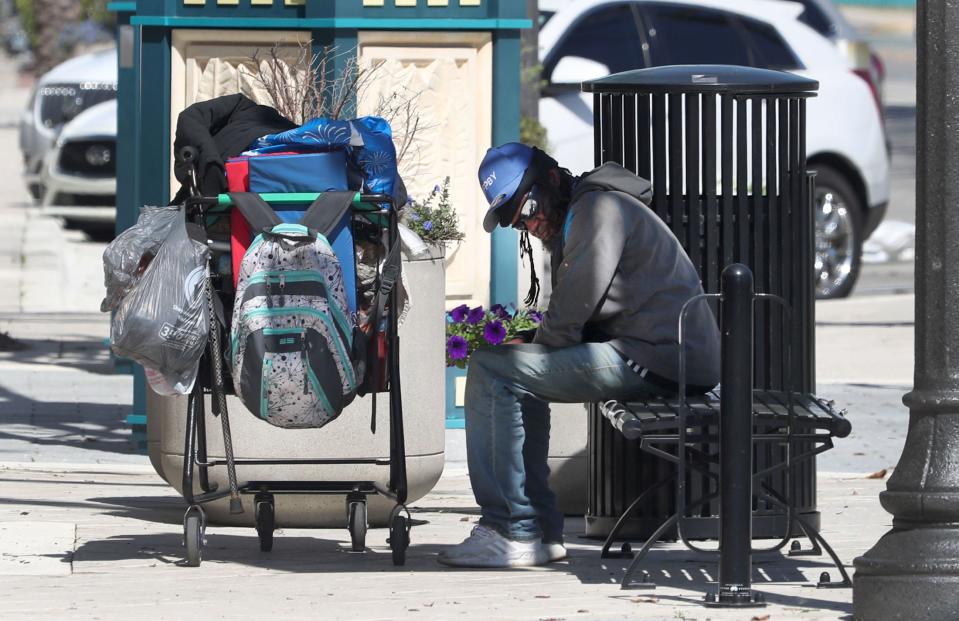
The 60-day pilot program will start this month and run through early May. Then city officials will decide if they want to permanently station security guards along Beach Street.
Vagrancy, homelessness and panhandling have plagued the historic downtown corridor for decades, but there's less patience than ever for those problems now that Cici and Hyatt Brown have invested more than $35 million to create the Riverfront Esplanade natural wonderland, the city is about to pour $30 million into Jackie Robinson Ballpark improvements, the city is funneling $12 million into Beach Street road and sidewalk refurbishment, and the $60 million Brown & Brown insurance headquarters tower has provided a stabilizing force on the north end of the road.
New approach to old vagrancy problem
After vagrancy problems ebbed in recent years, there was a flareup again last summer that hasn't let up, Kozinski said.
"Mid-summer last year it got bad again with the homeless out of the blue. It got constant," she said.
Beach Street business owners huddled several months ago to discuss the reawakened trouble, and they circulated a petition that garnered the signatures of 200 downtown residents and business owners who supported asking the city to provide more of a police presence on the road.
Police patrols increased for about two weeks last summer, and then the officer presence faded, Kozinski said. Police have told city officials they don't have ample staffing to spare an officer who would be devoted solely to the Beach Street corridor, something that was done several years ago.
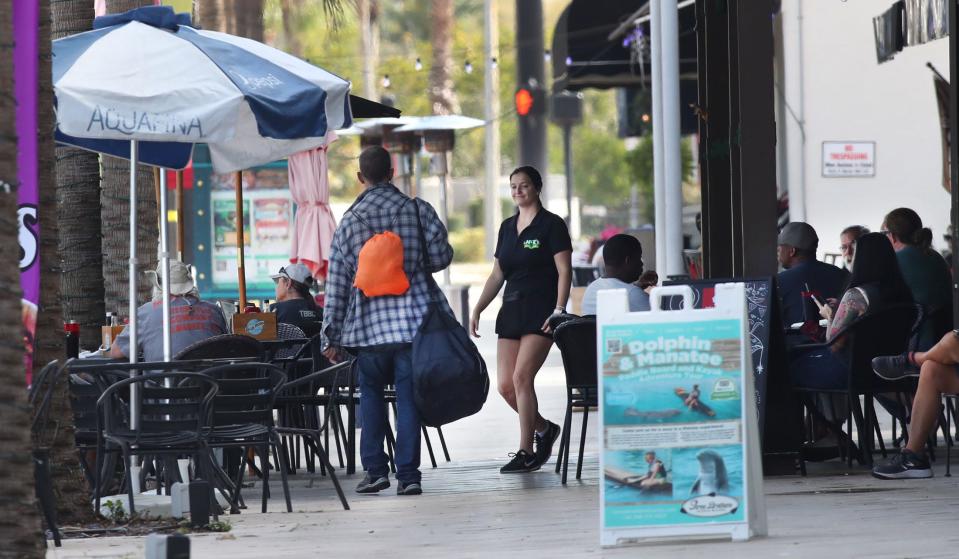
A few weeks ago, Beach Street business owners met with Mayor Derrick Henry to explain what they were dealing with. After that meeting the idea was hatched to try hiring the security officers, and Henry announced the plan during his closing comments at the March 5 City Commission meeting.
The city will use First Coast Security, the same company that has guards patrolling the Riverfront Esplanade, Brown & Brown's Beach Street property, and Brown & Brown's Ridgewood Avenue property. It's a coordinated effort that will allow the use of security cameras, radios and officers to deal with the vagrants who have plagued those few blocks of the downtown between Ridgewood Avenue and the river.
The Beach Street security officers will be able to reach police directly using their radios, the same thing esplanade officers can do.
Residents and business owners will be able to use a new app called See and Click to alert the security officers when they're having a problem or see someone else in trouble.
"We're trying to make sure people feel safe and comfortable during their business activities," said Ken Thomas, the city's director of redevelopment.
Deciding who foots the bill
When the security officer idea was discussed initially, city officials suggested business owners pay for it, Kozinski said. With the thousands of dollars Daytona business owners pay in property taxes each year, including one Beach Street property owner who said he pays $75,000 annually, there was strong pushback, she said.
The city then agreed to cover the full cost of the security officers, who will be paid $25 per hour, Thomas said.
One guard will patrol the southern end of Beach Street from 6 a.m. to 2 p.m. Monday through Saturday, and a second guard will patrol that end of the street from 2 p.m. to 10 p.m. those six days every week.
That will cost the city $2,400 per week, and a full eight weeks would come to $19,200. City Manager Deric Feacher is using his discretionary funding to cover costs.
Feacher can spend between $25,000 and $50,000 without city commissioners' approval. The type of expenditure dictates whether the city manager's spending cap is $25,000 or $50,000.
The money for the guards will come from Downtown Redevelopment Area funds, Thomas said.
City commissioners didn't object to the plan when it was discussed at the March 5 meeting. City Commissioner Quanita May, who runs a business on Magnolia Avenue just off of Beach Street, said she "absolutely" wants to see security guards come to the area.
"Homeless traffic is starting to escalate again," May said.
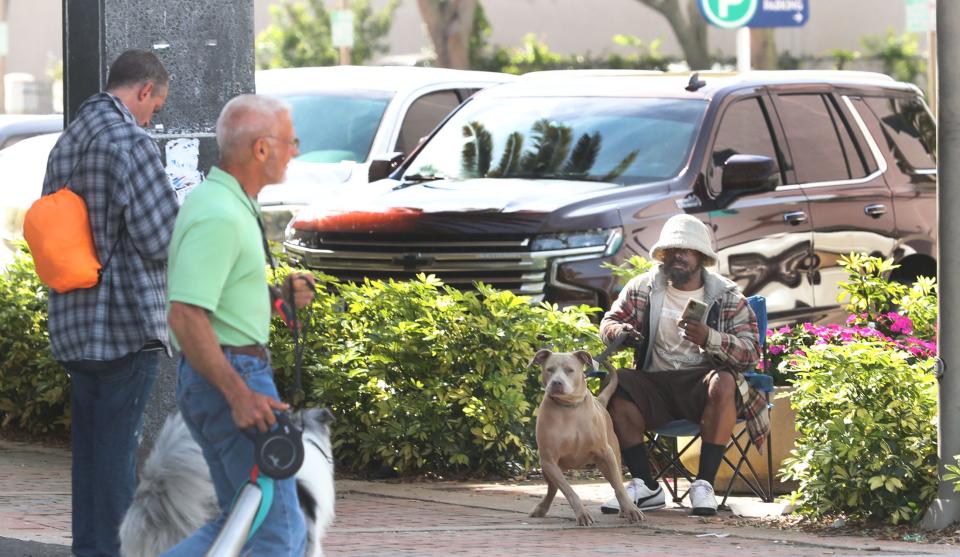
If the city wants to make the guards permanent, it will have to put out a request for proposals. City staff would choose the bidder with the lowest cost who met all the city requirements. City commissioners would then make the final decision.
The city would like to eventually have five security officers along Beach Street, and more officers in the city's other community redevelopment areas on the beachside, in Midtown and along Ballough Road, Thomas said. Officers could one day use bikes and Segway electric scooters to patrol, he said.
'We can't start it fast enough'
The idea to add the unarmed guards was inspired by ambassadors other cities use, including Orlando and Riviera Beach in southeast Florida, Thomas said. Riviera Beach uses its ambassadors to pick up trash and cut overgrown lots, he said.
Ambassadors can also be guides for people looking for a store or place to park. Daytona Beach hopes to eventually have ambassadors along Beach Street, but not in the immediate future.
"We're doing something totally different," Thomas said. "We want to curb the unwanted activity people are experiencing downtown."
While the Beach Street guards will be focused on keeping people safe, they'll be able to answer simple questions about the road's businesses and the area. They'll also build relationships with the business owners and learn when shops are open and closed so they know the normal rhythm of the road.
"We're excited. We can't start it fast enough," Thomas said. "We're trying to set a tone that it's a comfortable and safe place."
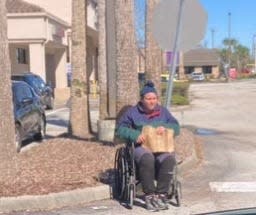
While business owners and downtown residents say panhandling has gotten bad again along Beach Street and at major intersections throughout the city, Daytona Beach police can't enforce the city's ordinance that regulates panhandling. That's because a judge issued an order in August banning use of the local law while a federal lawsuit challenging the city's panhandling ordinance is decided.
"People say 'I can't even eat lunch or dinner downtown without being approached,' " said Joe Yarbrough, manager of the Riverfront Esplanade. "When you try to ignore them, they'll follow you into the business or back to the office."
Yarbrough is hopeful the security guards will help that situation. And police can still enforce laws that address trespassing, assault, theft, drug dealing and other crimes the downtown vagrants have been accused of.
The root of the problem
Paul Zappitelli is happy to hear the city is addressing problems on the riverfront. Zappitelli and his family live in a 4,000-square-foot apartment in their three-story Beach Street building that also houses 10 other rental units and their restaurant, Zappi's Italian Garden.
He said there's only about six homeless people regularly hanging around the south end of Beach Street, but they're continually causing problems. Zappitelli said all of his tenants have been panhandled, and he's seen one homeless person in the area dealing drugs.
One man living on the street has a large, aggressive dog that tried to attack Zappitelli's much smaller dog when he was taking it for a walk Thursday afternoon. Zappitelli said he's watched people walk off of the sidewalk and into the road to avoid the large dog, which appears to be a pit bull mix.
A homeless woman who lives near Zappitelli's restaurant hits up dozens of people for cash daily. She begins with a sweet request, but then quickly starts spewing expletives and yelling when she's turned down.
Some of the new Beach Street regulars sleep in the doorways and alcoves in front of businesses. Some just sit outside businesses smoking and using the merchants' Wi-Fi.
"They're not the kind of things you want your guests to see," Zappitelli said.
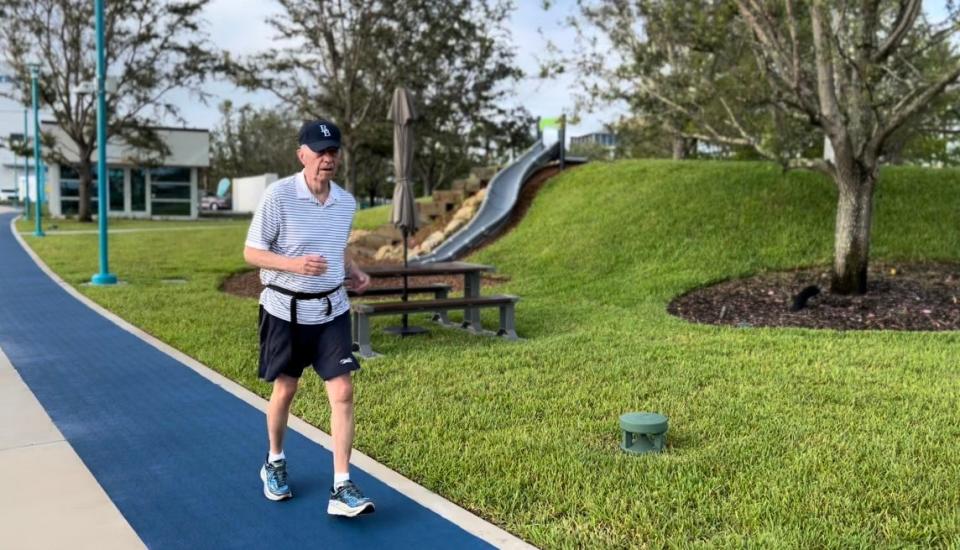
Kozinski has worked hard to create a unique place with a relaxed vibe, but vagrants sometimes shatter that. She used to have an acoustic Fender guitar in the shop anyone could play when they felt like making a little music, but someone stole it, she said.
She hopes the new guards will be in place in time for the crowds that will come to Beach Street for St. Patrick's Day, a children's business fair at the end of the month and the Cinco de Mayo celebration.
'We need to be more proactive'
The idea to add security guards or ambassadors has been discussed among Beach Street merchants for a long time, said Jack White, who owns multiple properties on the road and nearby.
Business owners have seen the dramatic improvements in the Riverfront Park property since it was reinvented as the Riverfront Esplanade, and part of that success comes from the esplanade's security guards.
"That's the kind of atmosphere we want to create on Beach Street," White said. "We need to be more proactive with the atmosphere we're trying to create."
Kozinski and White said the current homeless problem isn't as dire as it's been in the past.
"It's nowhere near as bad as it was years ago," White said. "But every step back is a concern."
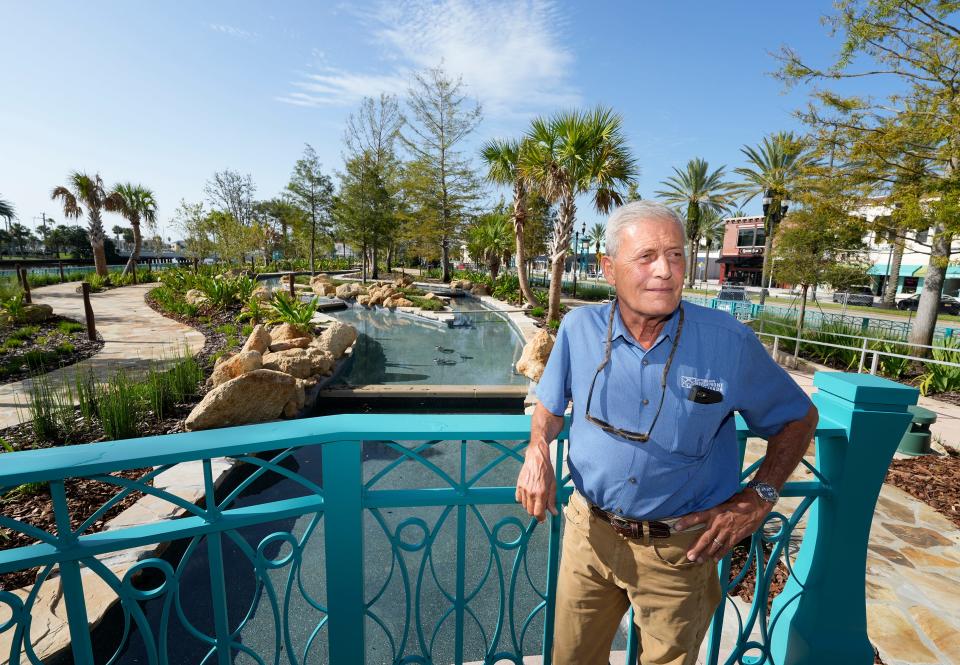
For many years, homeless people made the riverbank their roofless home. It was where they hung out, ate and slept. The area was full of trash, beer cans and needles before it was transformed into the esplanade.
Yarbrough said the occasional syringe is still found on the property, and people sometimes break outlets not meant for cell phone charging. People have also been caught in the esplanade late at night and trespassed off the property.
But overall it's a vastly different place than it was just a few years ago. A foundation's lease with the city allows it to operate the esplanade like private property now.
Another Daytona Beach homeless problem: Panhandlers, homeless camps are appearing in areas of Daytona Beach that may be surprising
Just the visibility of the security officers in the esplanade is a huge part of the reason the property has become so much more enjoyable to visit, Yarbrough said, noting the dozens of high tech security cameras also help.
When vagrants cause problems, as they sometimes do in esplanade restrooms and other parts of the property, they're pointed to the exits, he said.
"We monitor who's in the esplanade," Yarbough said. "The guards are our eyes and ears and it works very well. It's a deterrent, and it makes visitors feel safe."
You can reach Eileen at Eileen.Zaffiro@news-jrnl.com
This article originally appeared on The Daytona Beach News-Journal: Daytona Beach to try security guards to combat downtown vagrancy

